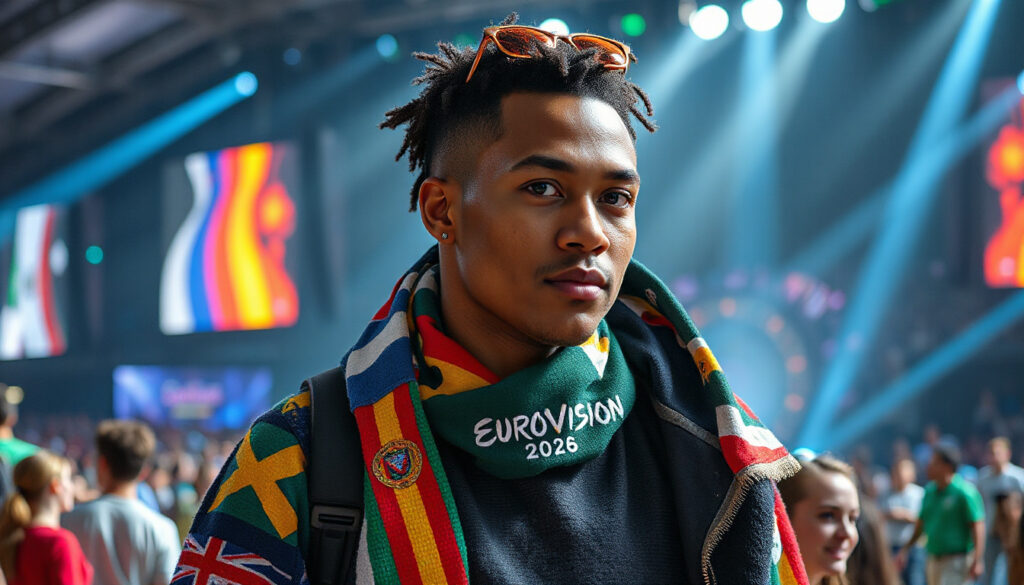As the excitement builds for Eurovision 2025, Croatian contestant Marko Bošnjak has taken a significant step by traveling to Switzerland to film his postcard.
This introductory video, which will be featured during live broadcasts of the contest, is more than just a quick clip; it’s an opportunity for Bošnjak to connect with the rich cultural backdrop of the host country.
With 37 countries participating this year, Croatia is back in the fray, showcasing its artistic talent amidst the glitz and glamour of Eurovision.
While Bošnjak prepares to present his song ‘Poison Cake’ in the first semi-final, his postcard filming adventure serves as a reminder of the tradition that has become integral to the Eurovision experience.
Now, let’s delve deeper into Bošnjak’s journey and explore the significance of postcard filming within the context of this beloved competition.
Claim Your £30 Free Bet – Deposit Just £10 to Play! T&C’s Apply

Key Takeaways
- Marko Bošnjak is set to represent Croatia at Eurovision 2025 with his song ‘Posion Cake’.
- Postcards have been a key tradition in Eurovision since 1970, evolving to showcase artists and their connection to the host country.
- Croatia has a history of fluctuating success in Eurovision, with a notable second-place finish in
2024.
Marko Bošnjak’s Journey to Eurovision 2025
Marko Bošnjak, the talented Croatian contestant representing his country at Eurovision 2025, has just touched down in Switzerland to film his postcard – a vital piece of the Eurovision puzzle.
This year’s event marks a significant return to the tradition of shooting postcards in the host country, a practice that was put on hold since
2019.
These short introductory clips serve not only as a warm welcome to viewers but also present a unique opportunity for artists to forge a deeper connection with the host nation.
Croatia is among the 37 nations participating this year, and artists like Bošnjak are excited to showcase their talents against the stunning backdrop of Switzerland.
Bošnjak will showcase his musical prowess with the captivating song ‘Posion Cake’ during the second half of the first semi-final on May
13.
Since their inception in 1970, postcards have evolved from mere promotional tools for the host country to becoming a charming prelude that highlights each artist.
Croatia, which made its Eurovision debut in 1993, has enjoyed a rollercoaster of results, with its pinnacle achievement occurring in 2024, when the vibrant act Baby Lasgana, took second place with the catchy number ‘Rim Tim Tagi Dim.’ After a hiatus from 2013 due to financial constraints and disappointing performances, Croatia confidently returned to the contest in 2016, and fans eagerly await Bošnjak’s performance this year.
The Tradition of Postcard Filming in Eurovision
The postcard filming tradition at Eurovision not only enriches the viewing experience but also provides a platform for cultural exchange.
Each year, the participating countries have the chance to showcase unique landmarks and traditions through the eyes of their representatives.
This year, the selection of Switzerland as the host adds an alluring aesthetic to the postcards, featuring its breathtaking landscapes, historic sites, and vibrant culture.
Viewers can anticipate a delightful representation of Swiss heritage intertwined with the personal stories of artists like Bošnjak.
As the postcard clips play a crucial role in setting the stage for contestants, they also offer fans a glimpse into the lives and backgrounds of the performers, creating a more immersive experience.
By returning to this practice, Eurovision not only enhances its visual appeal but also reaffirms its commitment to celebrating diversity and creativity among the nations it brings together.







